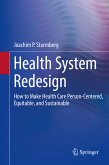In this book, the authors, as policy analysts, examine the overall context and dynamics of modern medicine, focusing on the changing conditions of medical practice through the lens of corporatization of medicine, physician unionization, physician strikes, and current health policy directions.
Conditions affecting the American medical profession have been dramatically altered by the continuing crises of cost increases, quality concerns, and lack of access facing our population, along with the ongoing corporatization toward bottom-line dictates. Pressures on practitioners have been intensifying with much greater scrutiny over their clinical decision-making. Topics explored among the chapters include:
- History of the Corporatization of American Medicine: The Market Paradigm Reigns
- Pharmaceuticals, Hospitals, Nursing Homes, Drug Store Chains, and Pharmacy Benefit Manager/Insurer Integration
- Medical Practice: From Cottage Industry toCorporate Practice
- Medical Malpractice Crisis: Oversight of the Practice of Medicine
- Big Data: Information Technology as Control over the Profession of Medicine
- Physician Employment Status: Collective Bargaining and Strikes
The Corporatization of American Health Care offers different perspectives with the hopes that physicians will unite in a new awareness and common cause to curtail excessive profit-making, renew professional altruism, restore the charitable impulse to health provider institutions, and unite with other professionals to truly raise levels of population health and the quality of health care. It is also a necessary resource for health policy analysts, healthcare administrators, health law attorneys, and other associated health professions.
Dieser Download kann aus rechtlichen Gründen nur mit Rechnungsadresse in A, B, BG, CY, CZ, D, DK, EW, E, FIN, F, GR, HR, H, IRL, I, LT, L, LR, M, NL, PL, P, R, S, SLO, SK ausgeliefert werden.









